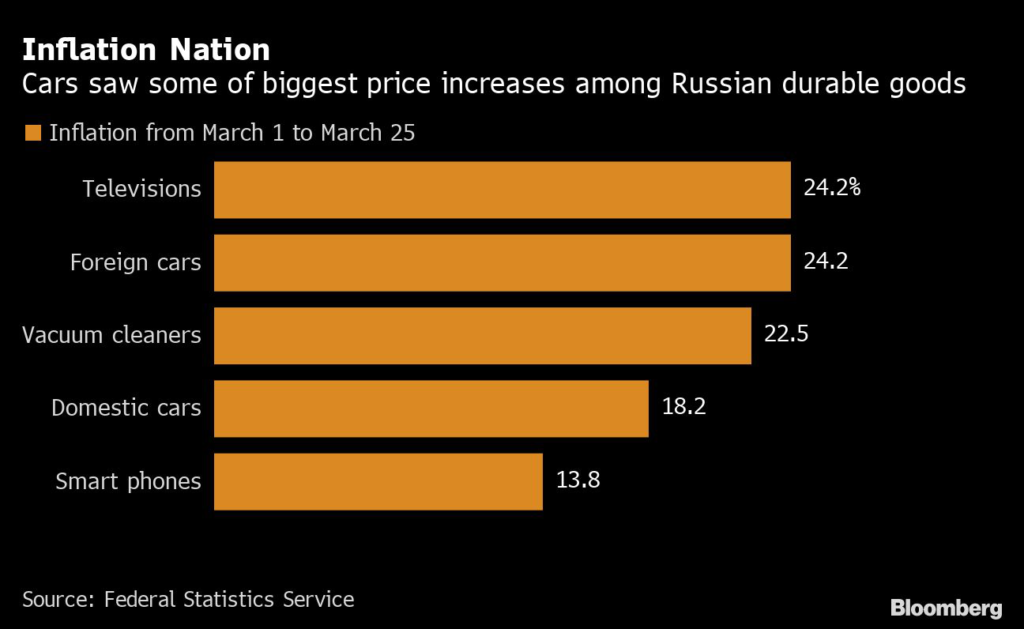(Bloomberg) — Russian car sales plunged last month as sanctions imposed over the invasion of Ukraine battered the ruble and many global auto companies joined a boycott of the country, leaving buyers confronting sparse showrooms.
New vehicle sales fell 60% in March from the previous month at Rolf, Russia’s largest dealership, according to Chief Executive Officer Svetlana Vinogradova.
She forecasts that demand will fall by half this year to a level on par with Spain, which has one-third the population of Russia.
The collapse in car sales comes with consumers shifting their spending to essentials as they brace for a recession brought on by the war.
Vehicle prices rose 40% in March by some estimates, while automakers from Toyota Motor Corp. to Volkswagen AG halted production in Russia as part of an unprecedented international boycott.
With buyers facing higher prices and fewer options, the government is seeking to stimulate domestic production.
Imported cars from Europe and Japan may be replaced with Chinese and Indian models, according to Anton Shaparin, a vice-president of the National Automobile Union.
“Many people are saying that our Chinese comrades won’t leave our market,” Shaparin said, noting that prices for Great Wall Motor Co.’s Haval cars assembled in Russia have risen 50% since the invasion.
“Of course they won’t, they’ll milk it until the last ruble.”
That contrasts with producers from Ford Motor Co. to Honda Motor Co. that are no longer shipping vehicles or spare parts to Russia.
Renault SA suspended operations in what is its second-largest market and warned it may write down the value of its business.
Local carmakers’ heavy reliance on imported components has also led to sticker shock.
The largest domestic producer, Renault-owned AvtoVaz, raised prices three times so far this year.
Russia’s Federal Statistics Service said last week foreign car prices rose 29% from the start of the year.
Kazakh Cars
With new cars hard to find in Russia and accelerating inflation threatening to devalue their savings, some Russians have turned to neighboring markets that have remained open to them.
Russian customers accounted for about 10% of sales at Autodom in the Kazakh city of Kostanay, 180 kilometers (110 miles) from the border, according Yevgeniy Biber, the dealership’s sales chief.
Previously, they made up about 1% of buyers, he said.
Even before the crisis, Russia was already battling a deficit of new cars due to supply-chain disruptions and distribution delays that the automotive industry has contended with globally.
Russian new car sales last year were down nearly 50% from their peak in 2012 as the economy stagnated since the 2014 annexation of Crimea from Ukraine.
Amid a dearth of parts needed to keep factories open, Interfax reported that AvtoVaz plans to introduce a stripped down version of its Lada brand made with a minimum of foreign parts such as airbags and anti-lock brake systems.
Vehicle sales in March were among the worst in the last 15 years, according to Azat Timerkhanov of Russia’s Autostat consultancy.
“If Europe doesn’t restore deliveries, China will be the main beneficiary, at least in terms of market share,” Timerkhanov said.
“But volumes are going to continue to fall.”
More stories like this are available on bloomberg.com
©2022 Bloomberg L.P.











